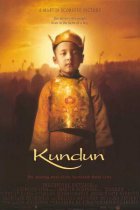
Kundun
- PG-13
- Year:
- 1997
- 134 min
- 1,193 Views
The Himalayas.
A still photograph, a portrait, of a mountain; the north
face of Chomolungma - a peak also known as Mount Everest -
twenty-nine thousand feet high.
We hear a very young boy speak.
BOY (VO)
Mama, my story.
A woman speaks:
WOMAN (VO)
Again?
BOY (VO)
Tell me.
Portrait of a mountain - Khangbochen - craggy peaks covered
with snow, twenty-four thousand feet high.
WOMAN (VO)
Your father had been very ill,
We thought he would die, and some
animals had died.
BOY (VO)
Cow.
Portrait of a mountain - Shishapangma - twenty-six thousand
feet high.
WOMAN (VO)
And a yak. And chickens. And we
had four years of bad crops, all
the farmers did.
Portrait of a mountain - Anye Machin II - twenty thousand
feet high and slightly obscured by clouds.
WOMAN (VO)
In the night, I knew you were coming.
Now, the foothills. The still photograph of this barren
mountain range comes to life as we see something moving.
It is a small caravan - traveling this narrow mountain pass.
WOMAN (VO)
At dawn, you were born.
CLOSER on this caravan. We can make out eight or ten men,
walking, and on horseback, dressed in heavy, brocade coats,
and large woolen hats, black braids trailing down their
backs. A yellow palanquin is carried by four large monks,
wearing maroon robes.
The caravan reaches the top of the mountain pass and turns -
a sudden shift in direction - a switchback. The travelers
head downhill.
BOY (VO)
Tell me.
Now, we see the mens's destination. A lake. An incredibly
blue, circular lake, sunk between snow-dusted mountains. It
is LHAMO I' LATSO - "the Oracle Lake" - and it shimmers in
the sunlight.
As the lake comes into view, a young man pushes back the
curtain of the yellow palanquin and peers down at it.
The man is dressed in royal robes. He is young, twenty four
years old. His name is RETING RINPOCHE. He is the Regent
of Tibet.
The color of the lake changes - from brilliant turquoise, to
a deep, murky, unfathomable darkness.
WOMAN (VO)
You were a beautiful baby.
So calm.
BOY (VO)
No cried?
The woman laughs.
WOMAN (VO)
Maybe, just a little.
The palanquin is set down on a flat rock overlooking the
lake. The water's color changes again, to a deep purple,
then blue again, then red, then indigo.
WOMAN (VO)
And that day, your father
got better. He named you Lhamo.
"The Protector."
BOY (VO)
I know.
Silence.
The noblemen and monks surround Reting as he steps out of
the palanquin.
One man stands out here, a monk, a high lama in fact, with a
kind face and fantastic, mesmerizing eyes. He is the LAMA
OF SERA.
WOMAN (VO)
Go to sleep, Lhamo.
Reting stares at the lake.
The water turns a light grey, and an image appears - obscure
at first, then becoming more solid. A vision.
He sees a house - a small, stone, one-story, u-shaped house.
The house has a flat, tile roof and an unusual, wooden rain
gutter, with windows outlined in black and a prayer flag in
the courtyard. A spotted dog is in front of the house,
barking, though we cannot hear him. The vision becomes
completely clear, for an instant - clear enough to see the
face of a young boy at the window.
CLOSE on Reting Rinpoche. Looking. Searching.
Cut to:
a portrait of a mountain: Kyeri - a majestic,glacier mountain - the "house mountain" of the village of
Takster, Amdo Province, North Eastern Tibet.
Sound returns as the wind whistles around this jagged,
mountain peak and then the view moves down, below the tree
line, and into the rhododendron forest and the farmlands,
until it comes to rest on a small, stone, u-shaped house. A
house caught in the dawn's mist.
CLOSE on the face of a sleeping child: a boy, LHAMO
DHONDRUP, age two and one-half years. He is dreaming. He
is about to wake up.
Today, his life will change.
We stay on the boy's face until, slowly, his eyes open -
beautiful, dark, eyes.
INT. TIBETAN PEASANT HOME, KITCHEN DAWN (1937)
The MOTHER walks past the boy, her woolen skirt swaying in
the rosy light. A seven year-old brother - LOBSANG SAMTEN -
and a teenage sister - TSERING DOLMA - share Lhamo's kitchen
mattress. Lhamo looks at them, and then he turns to see the
heavy felt boots of his FATHER, as the man walks through the
room and out the door. Lhamo finds the kind face of his
MOTHER. She is looking at him.
EXT. COURTYARD DAWN
The boy walks across the stone courtyard as we hear the
sounds of this country morning: the snorting of horses,
clucking of hens, a command from the Father as the man feeds
the animals.
The boy scratches, he pees. He sees his Mother on the roof.
She is a silhouette against the dawn, as she feeds cedar and
yak chips into the incense burner - sending white, curly
smoke up, to circle the prayer flag and its clusters of
printed mantras.
We pull back as the spotted dog begins to bark.
Lhamo's house is the house in the vision.
INT. KITCHEN MORNING
It is a good day. There is cheese for breakfast.
Lhamo's Father sits on a cushion at the head of a low table.
Fresh bread appears, yogurt, roasted barley (tsampa).
Lhamo pushes at his Father.
LHAMO:
Me.
FATHER:
No. This must stop.
LHAMO:
Me. Here.
FATHER:
I am the father. You sit there.
LHAMO:
Me here.
MOTHER:
What is the harm?
FATHER:
He will grow up all wrong.
Only you can serve him,
only you can wash his bowl.
Too tidy, everything just so.
He must know his place.
LOBSANG SAMTEN:
He thinks he is king here.
No respect.
MOTHER:
What is the harm?
The Father reluctantly gets up and gives his seat to Lhamo.
Lhamo settles and waits for his Mother to hand him his bowl
of tsampa. He bestows a most beautiful smile on his family.
EXT. COURTYARD DAY
The Father is leaving the yard with a short string of horses
when there is a sudden commotion.
The CHINESE GOVERNOR is passing through this little village.
He is a ferocious looking man, dressed in ornate brocade,
his horse eguipped with tack that looks like armor. He is
surrounded by a dozen Chinese soldiers, all on huge horses,
ruling the road, kicking up mud.
Lhamo's Father stops. He holds still. He looks to the
house.
The Mother is holding the children against her in the
doorway. Quiet. Watching.
The Governor and his entourage move on. When they are out
of sight, Lhamo's Father makes his departure.
EXT. COURTYARD DAY
Lhamo straddles the window sill, slapping his bottom as if
he were a horse, shouting:
LHAMO:
I go away.
Look, mama, I go away.
Far, far, far.
His Mother is making bread in the kitchen.
MOTHER:
Oh, no. Where will he go?
LHAMO:
Far, far away.
INT. KITCHEN DUSK
Lhamo is playing a game with pebbles on the raised, wooden
platform in the kitchen. The fire is lit. He is alone.
The dog begins to bark.
MOTHER (OC)
Good day.
MAN (OC)
Good day.
MOTHER (OC)
Please, come in, so cold.
MAN (OC)
We are traveling to Lhasa. May
we...?
MOTHER (OC)
Of course, please, this way.
Your servant may use the kitchen.
MAN (OC)
Thank you.
A middle-aged man, the SERVANT, wearing heavy, ragged
Translation
Translate and read this script in other languages:
Select another language:
- - Select -
- 简体中文 (Chinese - Simplified)
- 繁體中文 (Chinese - Traditional)
- Español (Spanish)
- Esperanto (Esperanto)
- 日本語 (Japanese)
- Português (Portuguese)
- Deutsch (German)
- العربية (Arabic)
- Français (French)
- Русский (Russian)
- ಕನ್ನಡ (Kannada)
- 한국어 (Korean)
- עברית (Hebrew)
- Gaeilge (Irish)
- Українська (Ukrainian)
- اردو (Urdu)
- Magyar (Hungarian)
- मानक हिन्दी (Hindi)
- Indonesia (Indonesian)
- Italiano (Italian)
- தமிழ் (Tamil)
- Türkçe (Turkish)
- తెలుగు (Telugu)
- ภาษาไทย (Thai)
- Tiếng Việt (Vietnamese)
- Čeština (Czech)
- Polski (Polish)
- Bahasa Indonesia (Indonesian)
- Românește (Romanian)
- Nederlands (Dutch)
- Ελληνικά (Greek)
- Latinum (Latin)
- Svenska (Swedish)
- Dansk (Danish)
- Suomi (Finnish)
- فارسی (Persian)
- ייִדיש (Yiddish)
- հայերեն (Armenian)
- Norsk (Norwegian)
- English (English)
Citation
Use the citation below to add this screenplay to your bibliography:
Style:MLAChicagoAPA
"Kundun" Scripts.com. STANDS4 LLC, 2025. Web. 8 Mar. 2025. <https://www.scripts.com/script/kundun_890>.







Discuss this script with the community:
Report Comment
We're doing our best to make sure our content is useful, accurate and safe.
If by any chance you spot an inappropriate comment while navigating through our website please use this form to let us know, and we'll take care of it shortly.
Attachment
You need to be logged in to favorite.
Log In